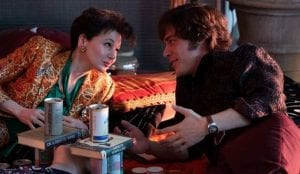Movie Review: ‘Judy’ gives us Garland at the end of her rainbow

By Heidi Sutton
“A heart is not judged by how much you love; but by how much you are loved by others.”
― L. Frank Baum, “The Wonderful Wizard of Oz”
Most people remember the legendary Judy Garland for her role as Dorothy Gale from Kansas in “The Wizard of Oz.” For die-hard fans, the actress, dancer and singer with the beautiful voice is also remembered for “Meet Me in St. Louis,” “Easter Parade” “Summer Stock,” “A Star Is Born,” the Andy Hardy films with Mickey Rooney and much more.
Fifty years after Garland’s death, director Rupert Goold brings us “Judy,” an adaptation of Peter Quilter’s musical “End of the Rainbow,” which explores the star’s final months on earth.

Set in 1968, the biopic is somber, sad, touching. Garland’s career, by this point, has already spanned more than four decades. At 46, the aging actress (played by Renée Zellweger)lives in and out of hotels with her children, Lorna (Bella Ramsey) and Joey (Lewin Lloyd), while grappling with the demons of her troubled showbiz life.
Down on her luck and out of money, she jumps at the chance to star in a London cabaret show, and leaving the children with their father and third husband, Sid Luft (Rufus Sewell), Garland heads to the Talk of the Town nightclub for a five-week run.
While there, she begins a whirlwind romance with musician Mickey Deans (Finn Wittrock), her soon-to-be fifth husband, reconnects with fans, and in a nod to “Oz,” all the while looks forward to getting back home to see her children. “Having children is like having your heart outside your body,” she explains. We meet Judy’s oldest daughter Liza Minnelli (Gemma-Leah Devereux) only briefly at a Hollywood party.
Garland suffers from insomnia, hepatitis, alcoholism, depression, anxiety, an eating disorder and is addicted to pills. Years of abuse, suicide attempts and nervous breakdowns have left her broken.
Occasional flashbacks to the MGM set and scenes with Mickey Rooney (Gus Barry) as a 16-year-old (played by Darci Shaw) attempts to shed light on how Garland ended up this way. MGM founder Louis B. Mayer (Richard Cordery) is portrayed as a monster, threatening Judy and making her take amphetamines and barbiturates to keep up with the frantic pace of making one film after another. “I make movies, Judy, but it’s your job to give those people dreams,” he tells her as they walk along the yellow brick road.

Zellweger is incredible in her portrayal of Garland as a lonely and frail victim of stardom. Her mannerisms and expressions are spot on while the tragic story she is telling is sometimes too hard to watch. The songs that made Garland famous — “Over the Rainbow,” “The Trolley Song,” “Get Happy,” are performed by Zellweger in the film — but only in snippets.
The film also highlights Garland’s faithful following in the LGBTQ community as she spends time with two gay fans (Andy Nyman and Daniel Cerqueira) in their apartment in one of the most poignant moments in the film.
In the final scene, Garland peers out into the audience and asks, “You won’t forget me, will you? Promise you won’t.” Six months later, she is dead from an accidental barbiturate overdose. At her funeral, Garland’s “Wizard of Oz” co-star Ray Bolger said, “She just plain wore out.”
Rated PG-13, “Judy” is now playing in local theaters
Photos courtesy LD Entertainment and Roadside Attractions






